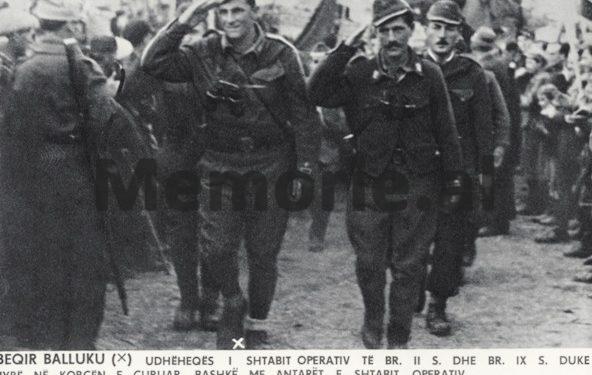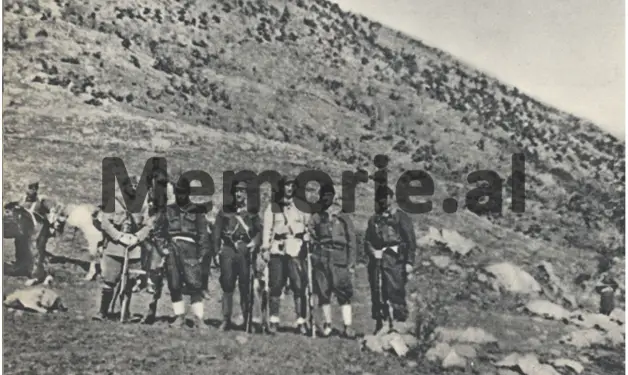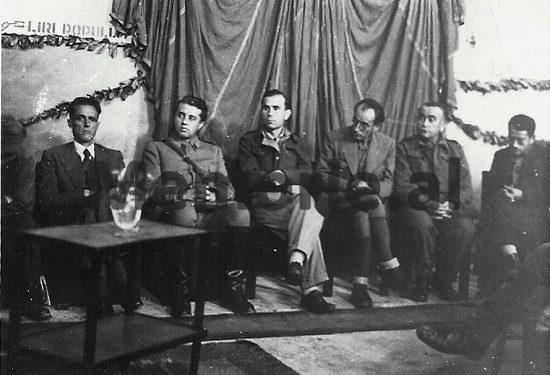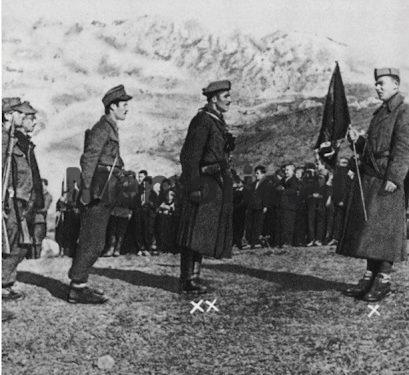By Gjergj Titani
Part eight
Memorie.al / For the first time, we have been able to provide the witness account of many historical events. The conversation with Pandi Kristo, a senior figure of the Communist Party of Albania and the Albanian state, took place in Tirana, in the house of his son-in-law, Robert Vullkani, where he was forced to live, when he was released from exile, since the Albanian democratic state, never gave him a home. The regime, for which he fought, targeted him to liquidate Pandi Kristo, placing him in the group of Koçi Xoxes, convicted for “hostile activities”. For 42 years in a row, I would wander the prisons of the communist dictatorship and successive exiles, until communism was overthrown forever, at the beginning of the 90s. The interview was conducted in 1992 – 1993 and over the years, it was completed, according to the memories and family archive of Pandi’s daughter, Assembly Kristo (Vullkani), sister, veteran of the Anti-Fascist National Liberation War, his son-in-law, Robert Vullkani, and the memories of many contemporaries. Here is Pandi Kristo’s confession.
Continues from the previous issue
Mr. Pandi, you spoke briefly about the Eighth Plenum of the Central Committee of the NPSH. While another highly discussed plenum is the 11th Plenum of the Central Committee of the KPSH. What do you remember from his works?
To talk about the Eighth Plenum, which constituted the final stage of the legal history of the Communist Party of Albania, I could and should have talked more. In fact, I should have said a lot about those plenums, where, with our naivety, but also because of our mistakes, which would often constitute political guilt, we inadvertently helped the absolutization of Enver Hoxha’s power. One of these mistakes was the very easy exclusion of Sejfulla Malëshova, who was effectively the most theoretically prepared person, with more than 20 years of experience, in the Communist Movement. Another mistake was blaming, condemning our wonderful friend, Nako Spiru, who was an original product of the progressive movement, and then the communist movement of the Anti-Fascist National Liberation War.
After the exclusion of these two powerful personalities, with the malicious intervention of the Soviet-Yugoslavs, the Political Bureau found itself weaker and more unable to solve the complicated problems of the initial period of building a new life. It became more subdued, after the loss of these two talents, giants, of Albania’s political and economic thought. Here begins that unforgivable submission, which seemed to be reborn in the Second Plenum of Berat, which revealed hope for the smooth progress of affairs in our blessed country. But the great shocks for the NPSH had just begun, with the expulsion of Sejfullai from the Central Committee and the monstrous accusations against Nako Spiru, which drove that boy with special courage to commit suicide.
After his suicide, the Central Committee of the KPSH lost its clarity, foresight, courage, in order not to be subservient to foreigners; it lost the eloquence of two great thinkers and activists. So, the Eighth Plenum of the Central Committee of the KPSH was the end of a successful stage of the Albanian Communist Party, while the 11th Plenum was the beginning of the blackest stage, which would continue until the death of the dictator. This plenum marked the capitulation of the NPSH to everything ominous, enabled its usurpation and left the working class, effectively, without the party that was supposed to represent it in its entire path. The 11th Plenum of the NPSH held its long proceedings, from September 13-24, 1948, in an extremely heavy and oppressive situation.
The members of the Central Committee, in fact, discussed with passion and arrogance, shouted and released “lightning and lightning”, according to the instructions they had received from Enver Hoxha and his followers. We happened to be almost unprepared, because Enver’s group was plotting behind the scenes. For example, while Enver Hoxha was not playing from Tirana, he sent Koçi Xoxen, as a delegate of the Central Committee, to the commemoration of the establishment of the First Assault Brigade, in Vithkuq of Korça. He even approved a trip to Kochi, to Panari and its surroundings, to remember once again those places where he fought during the enemy’s Winter Operation!
At this time, I, for the first time in my post-liberation life, was on an extended vacation in Pogradec. There, Enveri together with our family also sent Nexhmija! What was this generosity of Enver, not his wife would play the role of our strict observer?! Enver Hoxha, throughout the preparatory time of the 11th Plenum and the First Congress, did not move from Tirana. These times, they changed cars, drivers and companions of our group, with companions of their own group, for reasons that are not difficult to understand. The 11th Plenum revised in an illegal and anti-statutory manner, all documents, statements, resolutions, decisions and others, from the Second Plenum of Berat onwards.
He called the Minister of the Interior, the Deputy Prime Minister and the Organizational Secretary of the Central Committee of the KPSH as “conductors of the Yugoslav line” and that he used these positions to put the party under the control of the State Security. Enveri, using police management methods in the party, has seriously violated democratic centralism, both in the party and in the government. The consequences are known. Now, the spirit of principled criticism and self-criticism was totally absent, and discipline and other things were weakened. The 11th Plenum announced to the world that the main enemy of Albania and of all humanity was the American and English imperialists.
Titua, according to the decisions of the 11th Plenum, was the traitorous leader, revisionist, enemy of Marxism-Leninism, the socialist camp and our country. These were the pompous declarations of this plenum, which would lay the foundations of a half-century long persecution, which marked extraordinary victims, imprisonments, exiles and physical disappearances, of thousands and thousands of cadres, not only communists, but also those who thought differently from Enver, or the ideas he propagated. So, instead of a new democracy flourishing, a rampant and unprecedented dictatorship flourished.
I want to emphasize that, before the proceedings of the 11th Plenum, Enver Hoxha gathered around him, without the knowledge of the Central Committee, a group of his loyalists, such as: Manush Muftiu, Hysni Kapo, Haki Toska, Peço Kagjini, Beqir Balluku, Behar Shtylla, Petrit Dume, Hito Čako, Spiro Koleka, and others separately, read and commented on the “famous, enlightening” letters of the Central Committee of the Communist Party of the Soviet Union, which had nothing to do with the activity of the NPSH, but they were letters signed by Stalin and Molotov, which baselessly accused and stigmatized the Yugoslav Communist Party, the Government Yugoslavia and its army
Meanwhile, I, Koçi, Naxhija, Nesti, Vaskë Koleci and others, had absolutely no knowledge of these actions of Enver, who had received these documents confidentially from Ambassador Çuvahin, who had his special mission, commissioned by Moscow, to support Enver.
What were the austerity measures that Enver Hoxha took on the eve of the 11th Plenum and the First Congress of the NPSH?
During this period, there was a new secret deployment of troops removed from the border areas of Leskovik, Kolonja, Përmet, Gjirokastra, around the city of Korça and the hills of Tirana, under the command of Pandeli Varez, who, as I learned later, was sentenced by the Military Court to 25 years in prison. Thus, the troops commanded by him were placed around the hills of Sauk, Kashar, Petrela and kept the city of Tirana under surveillance. The military patrols of these departments moved in the capital and often met at night with those of the police. In addition, in order to leave Tirana, the police forces, which depended on the Ministry of Internal Affairs, and were called loyal to the Koçi Xoxes group, were sent, as a simple arm force, to work on the Durrës-Tirana railway.
Pandeli Varrezi, shows how Hito Çako, who was at that time commander of the Military Garrison of Tirana, was unhappy with these actions, which contradicted the predetermined military rules. He asked repeatedly, full of nervousness: “Who brought you to Tirana? What are you doing here, with these patrols of yours”, and others and others. While in Korça, other forces were stationed in Boboshtica, Drenovë, Mborje, and Voskop and kept the city under surveillance, without anyone’s knowledge. Even the Head of the Department of Internal Affairs knew nothing about this illegal deployment. Now, I know many details about these dislocations and this is the truth, but what would be the value of a detailed analysis of all the evil actions of those days, which, apart from their historical value, have no other value.
In my opinion, I say this, after I have thought for a long time, then, a military coup was being prepared in secret, under the leadership of Enver Hoxha, as Supreme Commander, or First Secretary of the Central Committee of the NPSH, of which remained tentative, because there was nothing like what he claimed. In the plenum, I also discussed. With naivety, I also made self-criticism, which was worthless, because after the plenum, I didn’t show up for work anymore, as we were put under strict police surveillance.
How did Enver Hoxha manipulate the old comrades of the Communist Group of Korça, to severely criticize you in the collection of Party assets in the districts?
After that, in the districts, the Party’s activities continued to inform the broad mass of communists, according to Enver’s wishes, about the decisions and resolution of the 11th Plenum. In addition to Enver and the group that accompanied him, Koçi Xoxe and I were present at the Party event in Korça. In the unscrupulous criticisms that were made to us in active, and specifically in that of Korça, even by our comrades, old militants, such as: Miha Lako, Pilo Peristeri and others, we were stigmatized with the most monstrous epithets. For example, the old partisan, Efti Iftica, asked the presidium: “What did Koçi Xoxe want to do with all these criticisms attributed to him?” At this moment, Pilo Peristeri, a veteran of the Communist Group of Korça, with whom we had shared all the troubles of the time of the Kingdom, the occupation and the war, intervenes and says: “Don’t you understand?! Yau I say. He had to become King…”!
In this activity, only Nesti Gambeta came to the defense of Koçi Xoxes and invited Enver to be more social, but this defense of Nesti was like a drop of water in the poisoned ocean of slander and accusations. I want to narrate another case, which I learned from the wonderful Xhavit Qesja. After we got out of prison, Xhaviti told me about an interesting thing that had happened in the asset of the dicasteries, Tirana. Sotir Vullkani, one of the founders of the Communist Group of Korça and the Albanian Communist Party, recently returned from Germany, where he was for the exchange of experience, as part of a delegation of the Ministry of Internal Affairs, outraged by the content of the delegates’ discussions, where, while the materials of the 11th Plenum were being worked on, he met with Enver and told him that; these problems and accusations that he raised against Koçi, Pandi and others, are mistakes made by all the members of the Central Committee, so he proposed that these should be resolved between them and not be raised in the plenum, that, according to him, except words, had no other value. Sotiri recommended to Enver that at the end, they choose a new Central Committee, and this is where it all ends.
During this time, did you have provocative interventions from anyone?
The attack of Enver Hoxha’s group continued according to orders from Moscow. I have a blatant case. Spiro Koleka comes to my office and tells me: The Soviet ambassador, Chuvahin, is waiting for you at the meeting to talk about the discussions with Koçi Xoxen, about the problems that were raised in the plenum materials. I responded negatively to the invitation, through third parties, that the Soviet ambassador gave me, telling Koleka that I had no reason to go to him. I had not discussed anything about this problem with Koci. I am mentioning this case to prove that not only the Russian embassy was carrying out illegal and unusual actions in international diplomatic practice, even more so, between two countries that called each other mother and brother.
I declare this, to show that the Stalinist scenario of a major strike against Tito and the Yugoslav Communist Party had been implemented for a long time, this conflict, with continental dimensions, and which would take, under its ruins, many people, in Albania, Bulgaria, Romania, Hungary, Czechoslovakia, East Germany, Poland, and some more, even in the Soviet Union itself. The 11th Plenum was finalized with the proceedings of the First Congress of the SNP, for which I have a very bitter impression, in my considerable experience in the Communist Movement.
What does the First Congress represent in the history of the NPSH and what is your opinion about it The First Congress of the NPSH, which took place from November 8 to 22, 1948, was attended by approximately 550 voting delegates and 300 consultative voting delegates, representing approximately 45,000 members and candidates party, would be an enlarged copy of the proceedings of the 11th Plenum. But, I would say, a better quality copy, because it’s general tests were done in party assets, in districts, in military units and in the 11th Plenum. The agenda of this congress was the following reports: “On the work of the Central Committee and the new tasks of the NPSH”, “On the economic plan of the state”, “On organizational issues and the draft statute of the party” and the elections of the Committee New Central, of the Revision Commission.
I remember that I stayed only the first few days, and then I left, because I could not endure, for thirteen or fourteen days, the distortions, shouting and accusations, of the most monstrous kind. I am convinced that when future generations read, if they have the patience, the materials of the First Congress of the NPSH and those that continued after that, they will be surprised by the manipulations and stupidity of their grandfathers, who had the courage to liberate Albania, from the foreign invaders and traitors of the country, and with such “courage”, to destroy it, which with much blood and sacrifice, they won in the fiery days of the War. Among other things, I want to say that, according to Xhavit Qesja’s assessments, after his release from prison, in those few days that we were able to meet and talk together.
This man, who was connected with the problems of the Political Bureau and the Central Committee of the KPSH, and especially personally with Koçi, reinforced my opinion that the report of this congress: according to him, the part about the birth and development of the Communist Movement in Albania, the creation and activity of the Communist Group of Korça, or the establishment of the NPSH, was written on the beach of Durrës, personally by Koçi Xoxe. This part of the report, as well as other parts of it, was taken by Enver Hoxha and used verbatim in the report he delivered at the congress. The first Congress of the SNP occupies a special place in the history of the Party, but let’s not forgets, not according to Enver’s statements, that it marked a major turning point in the life of the Party and the country. On the contrary, this congress marked the initial stage of the Stalinist-Enverist path, which would follow Albania and the ALP for more than 45 years, and which would be based on the basic Enverist dictatorship, the war of classes.
There was nothing more shameful, when I read in exile the constitution trumpeted so loudly by Enver Hoxha and his lackeys: “Albania is the state of the dictatorship of the proletariat”. Could anyone boast of this setting, this statement? No way. In the congress, there were also comrades who openly and silently never supported the materials of this monstrous congress, which sealed the dictatorial line of Enver, which continued until his death. What I am saying is confirmed by the fact that from that “glorious” period of Enver’s rule, now, only the dust of that great mountain of documents remains, the “magnificent, enlightening, guiding work, not only for us, but for the whole world”, we must not forget that according to Enver, we were: “the illuminating beacon of the whole globe”.
This shows how false, how hypocritical these slogans were, and hundreds of tons of paint were wasted. In this way, I never want to say that during the time of the People’s Republic of Albania, only bad and black work was done, absolutely not. The people and the working class of the People’s Republic of Albania, or the People’s Socialist Republic of Albania, as one of the APS congresses renamed our country, worked with dignity and very preoccupied and built with many sacrifices, great works, roads numerous, railways, draining of swamps, eradication of illiteracy and malaria, electrification and telephoning of the country, mass education of the population, free medicine and others and others.
But we must never forget that our country turned into a big camp, surrounded by barbed wire, effectively separated from the civilized world, where it did not exist, the unlimited issuance of passports for trips abroad, where it was the law agitation and hostile propaganda, the lives and dreams of Albanian youth were persecuted without any hesitation, where the powerful of the neighborhood and the operative of the Security prevailed at every step, where no right or freedom of the individual was applied. I declare, that I would fully agree with our punishment and persecution, if a better and more democratic time would come, than the time when we were in the leadership of the state, but unfortunately, the opposite happened.
Until Stalin died, the communist dictatorship, the class war raged on until the zenith, and then, with the courage and courage of the Communist Party of the Soviet Union, the epoch-making works of the 20th Congress of the Communist Party of the Soviet Union took place and when the hope was born, that even in Albania, as it happened in other countries of the East, the cadres would be repaired and rehabilitated, who had suffered from those monstrous distortions and accusations that were made against them. But, soon, this hope faded and was finally extinguished, as a result of the attitude, sometimes flattering and devious, sometimes conservative and extremist, of Enver Hoxha and his group, but also due to the inexcusable negligence of Nikita Khrushchev and the specialists of the Committee Central of the Bolshevik Communist Party of the Soviet Union, for Albania and other countries of People’s Democracy.
They are not forgiven for their majesty and indifference to these countries, while great epochal changes took place in the Soviet Union and in the life of its party and government. How was it possible that the Enverist dictatorial regime was allowed to rule in Albania?! This is what I would say about the proceedings of the First Party Congress, which ended with the arrest of me and the so-called Koçi Xoxes group, precisely on November 28, 1948, on the eve of the national holiday of Yugoslavia, while we had received invitations to go to the headquarters of the Yugoslav embassy. I remember like today, that day when I was called to the Central Committee, supposedly, for an important job, and there, in the desecrated building of the Central Committee, where many others had been arrested and would be arrested after me. I felt and was spiritually prepared, that this painful drama would happen…! Memorie.al
The next issue follows














